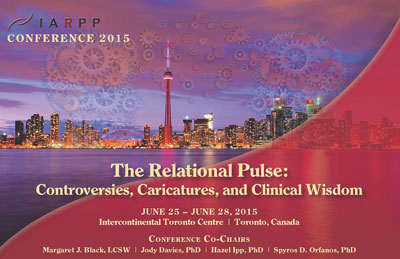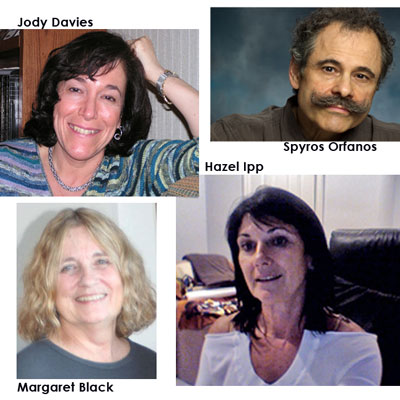By Hazel Ipp (Canada), Margaret J. Black (USA), Jody Davies (USA), and Spyros D. Orfanos (USA)
The weather may have been cool in Toronto, Ontario during the last week in June, but IARPP’s 12th Annual Conference was hot. For five days, relational scholarship and clinical material intersected to bring about a pulse that still lingers for many of the 468 registrants. In fact, many people attending the conference sought out the four conference chairs and members of the IARPP Board to express gratitude for the opportunities they were offered, both learning and social.
Coming from 15 countries and a sea of cultures, the registrants and participants (click here for photos from the conference) talked about the greatest strength of the relational perspective. This strength emerges when the multiple emphases within it are working in creative tension. This conference was not the a “same old, same old” about a “broad tent.” It had vitality, originality, and freedom of thought. It was made up of five pre-conference programs, five plenary sessions, two invited documentary films, an invited candidate panel, and 29 peer reviewed panels. In other words, it was a packed program. One might think that such full fare would leave registrants exhausted, but in fact they were energized.
Evidence of the energy at the conference was demonstrated on Saturday night at the Island Yacht Club party on Mugg’s Island. Partygoers braved rain and choppy waters like ancient seafarers as they crossed Toronto Harbour through Blockhouse Bay to eat, drink, and be merry. The Ugly Beauties, a rocking jazz band led by Marilyn Lerner of the Toronto Institute for Contemporary Psychoanalysis, provided the music. They were joined for some soulful improvisation by saxophonist Steve Knoblauch and songbirds Keith Haartman and Cleonie White. The dancing only proved that Dionysus too had registered for the conference.
Conferences, like all other products of psychoanalysis, tell stories, but they have their own individual histories as well. This conference was no exception. The inner logic and deeper motivations that went into planning and implementation were the culmination of transferring and adapting what we have learned during all the preceding IARPP conferences. We aimed to create an atmosphere for exploring how to hold dialectical tensions and heightened paradoxes, and how to live creatively and effectively given the conflicts and inherent multiplicity of the relational analytic world. If we approximated this aim, then the 2015 Toronto conference was an enormous success.
Perhaps the best way to describe the emotional atmosphere we experienced in Toronto is to note the very last comment from the audience as we wrapped things up at Sunday’s final plenary panel. Speaking impeccable English with a Russian accent, Marianna Zeltser, who was born in Moldavia and is a student at the Stephen Mitchell Center for Relational Studies in New York City, told of her deep appreciation for what the conference had given her. She then read a poem she wrote, capturing her emotional experience of the conference. Here is an excerpt from the poem:
He who is not lonely is never loved
Only through the longing we create reality of our dreams
We test and compare
But true one is felt in every way
Forgive with grace
And let all that hurts forever free
With love you matter
So shine your faith
Noble and kind one is searching
But not knowing yet
That I exist within this transcendent truth
By simply being
Let your humble heart be free
Let go…let it go…let it be.
On this poetic relational note, know that all roads lead to Rome in 2016 (see this eNews for information). May we meet again!



